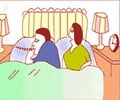A Canadian study of twins suggests that night terrors, which send children into sudden inconsolable screaming, may run in the family.
Children are often given to sleep terrors and sudden inconsolable screaming and parents to sleepless nights. A new Canadian study of twins suggests that such nightly horrors could be genetic.
"Our results show that there is a substantial effect of genetics factors in sleep terrors," ABC Online quoted Dr Bich Hong Nguyen, of the Sleep Disorders Centre at Montreal's Sacre-Coeur Hospital, as saying.The researcher, however, admitted that specific genes behind the phenomenon had not been identified as yet.
Describing their work in the journal Pediatrics, the researchers revealed that they studied 390 sets of twins, and found that identical twins were much more likely to both experience night terrors than fraternal twins.
I may be significant to note here that identical twins have nearly identical genetic makeups, while fraternal twins do not.
The team did not deny that environmental factors could be partially responsible for night terrors because the children were being raised in similar settings.
In all, the team observed that 37 per cent of the twin sets had sleep terrors at 18 months, and that the problem disappeared a year later for about half of them.
"(In contrast to nightmares) the onset of sleep terrors is abrupt and frightening, usually sudden arousal with screaming. During these events children seem confused and disoriented. Any attempt to awaken them may increase their agitation and prolong their episode," the study says.
She further said that night terrors could also be attributed to other factors like having a fever, full bladder, eating immediately before sleeping, and experiencing stress.
She said that parents of night terrors-experiencing children should not be overly concerned.
"They are not awake. Although they may communicate they are not receiving any sensory input. If you hear them, go and check on them and wait until they settle," she says.
Source-ANI
TAN/M
 MEDINDIA
MEDINDIA




 Email
Email






